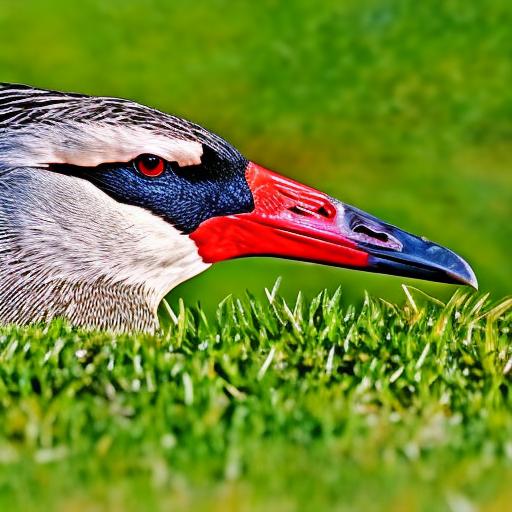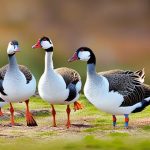Having geese on your lawn can be a charming sight, but it can also be a problem. Geese can cause damage to your lawn, leave behind droppings that are unsightly and unsanitary, and even become aggressive towards humans or pets. In this post, we will explore different ways to deter geese from your lawn in a friendly and humane manner.
Key Takeaways
- Geese are social animals that prefer to live in groups and are protective of their young.
- Geese are attracted to lawns because they provide easy access to food and water.
- Natural deterrents for geese include planting certain types of vegetation and using motion-activated sprinklers.
- Physical barriers such as fences and netting can be effective in keeping geese away.
- Creating a hostile environment for geese involves removing their food sources and making the area less attractive for nesting.
Understanding the Behavior of Geese
Geese are attracted to lawns because they provide a source of food and water. They are herbivores and feed on grass, seeds, and other vegetation. Lawns also provide open spaces for geese to rest and nest. Understanding their behavior can help us deter them effectively.
Geese are social animals and tend to gather in large groups. They have a strong sense of community and will often return to the same location year after year. They are also protective of their nesting sites and can become aggressive if they feel threatened.
Identifying the Reasons for Geese on Your Lawn
To effectively deter geese, it is important to identify the reasons why they are on your lawn in the first place. Common reasons include the availability of food, water, or nesting sites. By identifying the specific reason, you can choose the best deterrent method.
If geese are attracted to your lawn because of food, you can try removing any food sources such as fallen fruit or bird feeders. If they are attracted to water, you can try reducing the amount of standing water on your property. If they are nesting on your lawn, you may need to take additional measures to deter them.
Natural Deterrents for Geese
There are several natural deterrents that can be effective in keeping geese away from your lawn. One method is to plant certain types of grass that geese find less palatable. For example, Kentucky bluegrass is less attractive to geese than other types of grass.
Another natural deterrent is the use of decoys. Geese are territorial animals and will avoid areas where they see other geese. By placing decoys on your lawn, you can create the illusion of a larger flock and deter geese from landing.
Physical Barriers to Keep Geese Away
Physical barriers can be an effective way to keep geese away from your lawn. Fences or netting can be installed to create a physical barrier that prevents geese from accessing your lawn. These barriers should be at least three feet high to prevent geese from flying over them.
It is important to regularly inspect and maintain these barriers to ensure they remain effective. Geese are persistent animals and will try to find ways around or under the barriers. Regular maintenance and repairs will help keep them at bay.
Creating a Hostile Environment for Geese

Another way to deter geese is to make your lawn less attractive to them. This can be done by removing any food sources such as fallen fruit or bird feeders. You can also add obstacles such as rocks or shrubs to make it more difficult for geese to land and walk on your lawn.
It is important to note that these methods should not harm the geese. We want to deter them, not cause them harm. Creating a hostile environment simply means making your lawn less appealing to geese without causing them any physical harm.
Using Scare Tactics to Keep Geese at Bay
Scare tactics can be an effective way to keep geese away from your lawn. Noise makers such as air horns or whistles can startle geese and make them uncomfortable. Motion-activated sprinklers can also be effective in deterring geese, as they do not like getting wet.
When using scare tactics, it is important to vary the methods so that the geese do not become accustomed to them. Changing the location or type of scare tactic can help keep geese on their toes and prevent them from becoming desensitized.
Repellents for Geese
There are several repellents available on the market that can be effective in deterring geese. These repellents come in the form of sprays or gels and are applied to areas where geese are likely to land or feed.
These repellents work by creating an unpleasant taste or smell that geese find unappealing. They are safe for use around humans and pets, but it is important to follow the instructions on the label and apply them as directed.
The Role of Sound in Deterring Geese
Sound can play a crucial role in deterring geese. Geese have excellent hearing and are sensitive to loud or unexpected noises. By using sound deterrents, you can create an environment that is uncomfortable for geese and encourages them to leave.
Ultrasonic devices emit high-frequency sounds that are inaudible to humans but can be heard by geese. These devices can be placed on your lawn or near areas where geese are likely to gather. The sound will startle the geese and make them uncomfortable, encouraging them to leave.
Professional Help for Geese Control
In some cases, it may be necessary to seek professional help for geese control. If you have tried various deterrent methods without success, or if the geese population on your lawn is large and causing significant damage, a professional can help assess the situation and provide effective solutions.
When hiring a professional, it is important to choose a company that specializes in humane geese control methods. They should have experience working with geese and be knowledgeable about the most effective deterrent methods.
Preventing Geese from Returning to Your Lawn
Once you have successfully deterred geese from your lawn, it is important to take steps to prevent them from returning. Regular maintenance of your lawn, including removing fallen fruit or bird feeders, can help prevent geese from being attracted to your property.
Using multiple deterrent methods can also be effective in preventing geese from returning. By using a combination of natural deterrents, physical barriers, scare tactics, and repellents, you can create an environment that is unappealing to geese and encourages them to find another location.
In conclusion, deterring geese from your lawn can be a challenge, but it is possible with the right methods. By understanding the behavior of geese and identifying the reasons why they are on your lawn, you can choose the most effective deterrent method. Whether you opt for natural deterrents, physical barriers, scare tactics, repellents, or a combination of methods, it is important to create a hostile environment for geese without causing them harm. With patience and persistence, you can successfully deter geese from your lawn and enjoy a beautiful and goose-free outdoor space.
If you’re looking for effective ways to keep geese off your lawn, you might also be interested in learning about the best practices for setting up a chicken coop. Poultry Wizard offers a helpful article on “Where to Put Your Chicken Coop” that provides valuable insights on creating a safe and comfortable environment for your chickens. By implementing the right strategies, you can not only protect your lawn from geese but also ensure the well-being of your feathered friends. Check out the article here to discover more.
FAQs
What are some effective ways to keep geese off your lawn?
There are several effective ways to keep geese off your lawn, including using decoys, installing fencing, using repellents, and modifying the landscape.
What type of decoys can be used to keep geese away?
Decoys that resemble natural predators of geese, such as coyotes or owls, can be effective in keeping geese away from your lawn.
What type of fencing is best for keeping geese off your lawn?
Fencing that is at least 3-4 feet tall and has small mesh or wire spacing can be effective in keeping geese off your lawn.
What types of repellents can be used to keep geese away?
Repellents such as motion-activated sprinklers, noise makers, and visual deterrents like reflective tape or balloons can be effective in keeping geese away from your lawn.
How can modifying the landscape help keep geese off your lawn?
Modifying the landscape by removing sources of food and water, such as bird feeders or standing water, can help discourage geese from visiting your lawn. Additionally, planting tall grasses or shrubs can provide cover for geese predators and make geese feel less safe.
Meet Walter, the feathered-friend fanatic of Florida! Nestled in the sunshine state, Walter struts through life with his feathered companions, clucking his way to happiness. With a coop that’s fancier than a five-star hotel, he’s the Don Juan of the chicken world. When he’s not teaching his hens to do the cha-cha, you’ll find him in a heated debate with his prized rooster, Sir Clucks-a-Lot. Walter’s poultry passion is no yolk; he’s the sunny-side-up guy you never knew you needed in your flock of friends!







